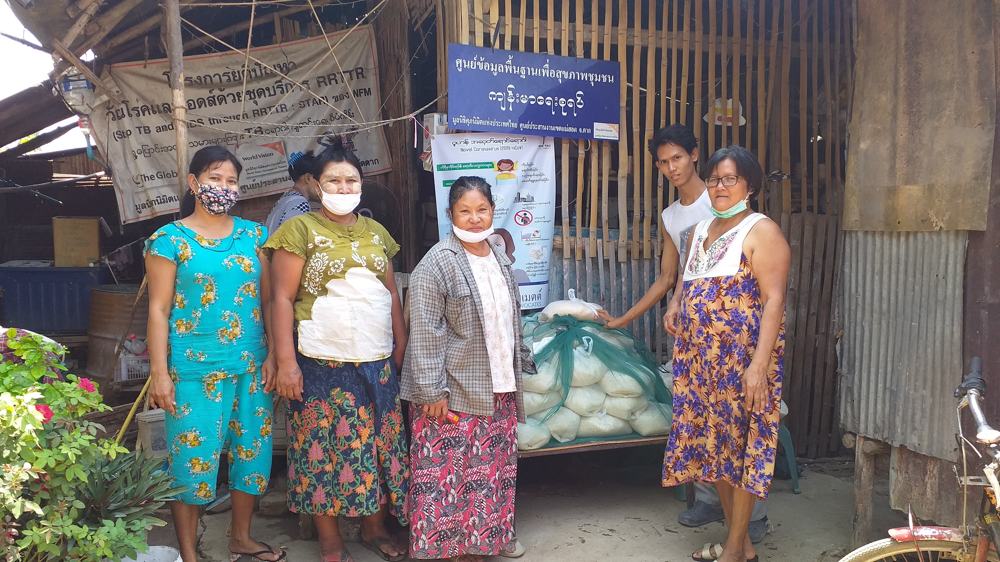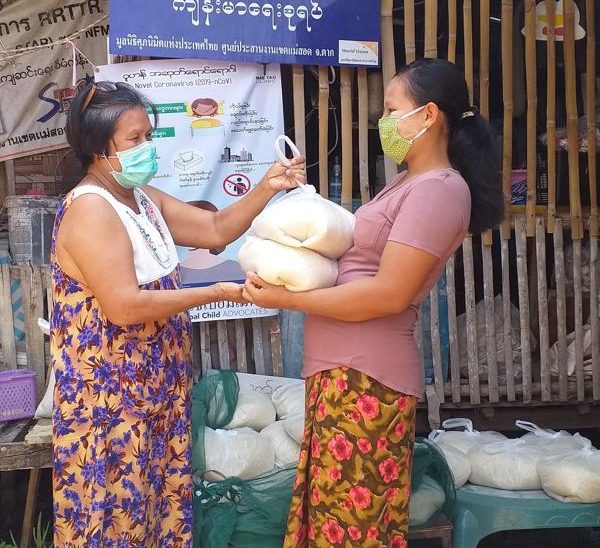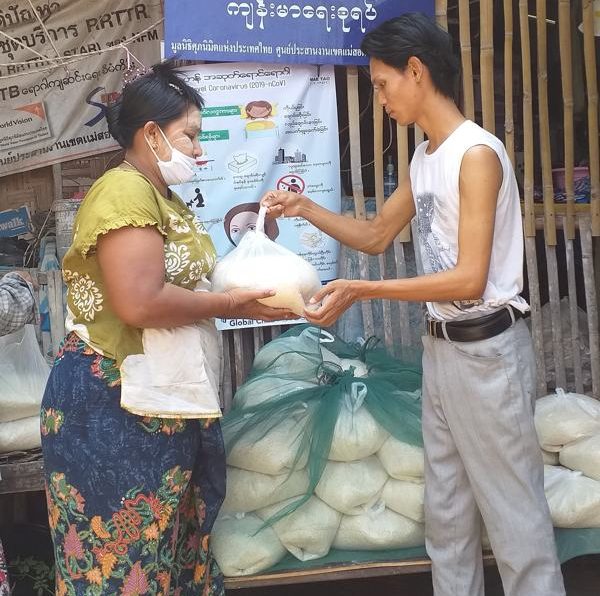We Can Take Care of Each Other

Daw Aye Min sat on the plastic mat on the floor of her bamboo house as the savings group members filed in. Normally, these meetings were exuberant affairs where the members talked, laughed, and shared snacks. Today was different. Everyone was subdued. The reality of their situation was beginning to sink in. Several more people had just lost their jobs.
It was the same everywhere, in all the migrant communities. One day they had work. The next day the factories closed, the restaurants shut down, the boss told them not to come back. At the same time, the borders closed. No one was permitted to leave, or enter, the country. Entire communities were locked down. In some cases, they were literally barricaded in. No one was allowed in or out. Food and water were getting scarce.
“At least we’re not like some of the communities who can’t even buy drinking water,” Daw Aye Min thought. She picked up her cell phone and started a video call on Facebook. Seyama Ching San would help lead this meeting from her own home, instead of coming to their community and risking the spread of infection.
They all wanted the meetings to continue. Savings groups had changed their lives. Not only had it helped most of them get out of debt, and save for the future or invest in a business, the encouragement they all got from each other to hope, to plan, to even dream, was the most important. Even if the meeting took 5 hours because of the difficulties of doing parts of it over video call, they were all there for it. But now, with so few of them having work, how would they be able to keep bringing the minimum amount to buy their shares every week?
After the meeting, Daw Aye Min lay in bed worrying. How would her neighbors feed their families? What would they do to survive until the restrictions are lifted and they can work again? What would become of them?
“Maybe I can contact an aid organization and ask them if they will help us,” she thought. “Maybe someone would be willing to give us rice.”
She did calculations in her head. Most people would run out of rice and dry food, like beans or canned fish, in a week, two weeks at the most. Migrant worker homes don’t have fridges in them. They buy their fresh food every day, from the small shops and markets that are everywhere in Thailand. Most workers stop at these markets on their way home, after they are paid for the day, and buy just enough for the evening and morning meal. Any more than that would be wasted, because there is no way to keep it from going bad if there are leftovers.
In two weeks, people would start going hungry. “We need to do something,” she decided, before falling asleep.
The next day, she called several other community leaders, most of whom were also members of a savings group. “What can we do can help our community?” she asked. “How can we help the families that don’t have work?”
After some conversation, they had an idea. They presented this idea in turn to the savings groups that Daw Aye Min hosted in her house. Three groups agreed to their idea.
They called Ching San. “We want to use the profits from the savings groups and buy rice for all of the members who don’t have work, especially the families that have small children. Can we do that?”
Usually, at the end of each savings cycle, the members are paid out a portion of the profits from the service fees in proportion to the number of shares they purchased. But all of them had agreed to give up their profits from this cycle, and use them to buy rice for those members who were most in need! “Of course you can,” Ching San told them, “If you’ve all agreed to it.”

Daw Aye Min hands rice to an unemployed savings group member.
Daw Aye Min asked if we could help transport the rice back to the community after they purchased it. But all of the Charis vehicles have been very busy transporting teams to each community to teach them about how to keep each other healthy and protect their neighbors through hand washing, mask wearing, coughing into their elbows instead of their hands, keeping their distance from their elders, etc.
So they asked around to find out who else they knew who had a car instead of waiting for us to have time to help them. They purchased 4500baht($150USD) worth of rice and gave it to the members most in need. They were able to give 10kg of rice to 24 families.
In this unexpected crisis, this community has responded to the challenges they face together with strength and generosity and has shown us just how strong they have become.
None of this would have been possible without you! Because you have supported our Family Enterprise Program, this community has the ability to help each other and take care of their own. Your committed investment in strengthening families and communities is paying off. Literally. You have made this moment possible.

Daw Aye Min’s son helps give away rice.
Carrien is co-founder of The Charis Project, Family Education Curriculum Developer, and mom of 6.
You can get her free mini-course on Making Your Family More Resilient here.
